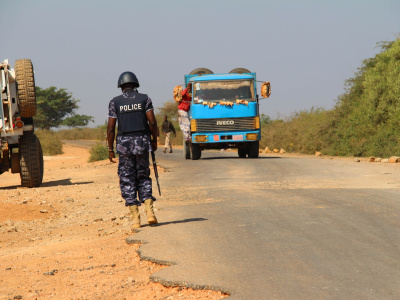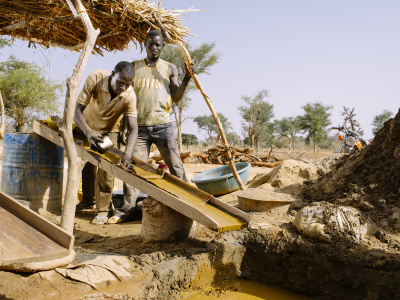
Making Sustainability Work for Communities, Countries & Companies – How Canadian Miner Sherritt International is Contributing to Madagascar’s Growth
Today, a mining company issuing a sustainability report is not the rarity it was a couple of decades ago. But issuing a 60-page annual sustainability report on a single operation is rare. It’s also an indication of just how holistically the Canadian mining company Sherritt International Corporation views both sustainability and governance at its Ambatovy nickel and cobalt operation in Madagascar.
Indeed, there are few companies operating anywhere in Africa with such a comprehensive program in place to “leave things better off than before we got there.”
First, some facts about Ambatovy: it’s owned 40 percent by Sherritt, 27.5 percent each by Sumitomo Corporation and Korea Resources Corporation, and five percent by SNC-Lavalin Incorporated. Sherritt, a global leader in hydrometallurgical processing technologies for mining, is the operator of Ambatovy. This operation has a mine reserve life of about 30 years and represents, at US$5.5 billion, one of the largest-ever foreign investments in Madagascar. Over $2 billion of that is in the form of project financing from a consortium of 14 lenders, including the European Investment Bank, the African Development Bank and Export Development Canada. The lending agreement requires Ambatovy to comply with the International Finance Corporation’s Performance Standards on Environmental and Social Sustainability, which are a globally recognised benchmark for sustainability practice in the private sector. Ambatovy’s compliance is audited several times a year by third-party experts that report to the lenders.
Madagascar is one of the poorest nations in the world, with literacy rates and lifespans perilously low, and half the population living below the poverty level. Following a non-democratic change in government in 2009, Madagascar’s transitional authority has failed to gain recognition from many industrialised nations, which in turn, resulted in the country receiving only limited foreign aid. At the same time, Madagascar is ground zero for biodiversity – an extraordinarily rich island nation in terms of plants and animal species.
This is the setting in which Ambatovy began operating in 2012 and continues to ramp up production.
Well before the beginning of construction in mid-2007, Sherritt had established a sustainability initiative driven by values that have informed its more-than 20 years of experience in Cuba, where it is also among the largest foreign investors and based on its success as the largest thermal coal producer in Canada and its performance as a public company traded on the Toronto Stock Exchange.
As Juanita Montalvo, Sherritt’s Senior Vice President, Corporate Affairs and Sustainability, says: “We’re a mining company – by our very nature, we impact communities. We’re not perfect. We make mistakes. What’s important is that we have robust procedures and systems in place to reinforce our values and commitments. Having clear guidance and training for our workforce is also key to minimizing negative impacts and maximizing positive ones.”
The Ambatovy Joint Venture has the potential to make nickel one of Madagascar’s most valuable exports and spark real and lasting growth of the nation’s economy. However, the country can end up succumbing to the “resource curse” – with little value-added and much left bare, in terms of effective governance, economic benefits, skills improvement, environmental sustainability, and improved livelihoods for the thousands of workers who built and work in Ambatovy, not to mention their 65,000 to 75,000 family members, the surrounding communities and, more broadly, Madagascar’s 22 million people.
How to avoid the “resource curse?”
This question is especially germane in a country that is struggling just to stand in place economically, socially and environmentally. An ongoing challenge in such fragile places is the need for governments to effectively administer their resources, in order to optimise in-country benefits in the long-run. Efforts such as the Extractive Industries Transparency Initiative (EITI) play a growing role in helping local stakeholders ensure greater government accountability on how payments received from mining companies are used. For its part, Sherritt has taken a leadership position in supporting two independently audited EITI publications in Madagascar, making public all their payments to government.
Sherritt is also pioneering a number of programs to significantly expand the skills of the Ambatovy workforce and more broadly, to make a meaningful contribution to strengthening Madagascar’s economy and institutions. Here, Sherritt draws on its two-plus decades of experience in Cuba, where it has been involved in many aspects of the nation’s economy and culture.
It took more people – almost 20,000 – to build Ambatovy than the 6,000 it needs to operate it, making sure that Ambatovy’s “hire locally” policy reached its target of 85% of the workforce well before production began.
Towards the end of construction of Ambatovy, Sherritt launched a unique program to provide demobilised workers with financial assistance over a fixed period, job-search support and agricultural training. This initiative was designed to help the transition to other income-generating opportunities and mitigate the effects of retrenchment.
Sherritt’s commitment to its workforce is mirrored in its work with local businesses. Since 2007, some US$1.5 billion in contracts has been awarded to Malagasy suppliers, and 56 percent of Ambatovy’s current supplier base is from Madagascar, with Europe the next highest-ranking area at 13 percent and Africa at 10 percent.
Indeed, the Ambatovy Local Business Initiative (ALBI) has been hailed by many as the single most important factor in helping Madagascar avoid the “resource curse.” Local hiring, along with a local supply chain, is already creating multiplier effects on local communities that payments to governments or social investment projects just can’t achieve.
ALBI is creating something even more important: by linking the local business initiative, contracts and procurement into a single supply-chain management function with embedded corporate responsibility values, mining companies around the world are taking notice of ALBI – and the determination of Sherritt and its partners in making it work.
All Ambatovy suppliers must pass a third-party audit that contains legal, organisational and performance requirements. The concept is relatively new to Madagascar and the audit program has brought about an extraordinary and, to some, totally unexpected effect. Suppliers who meet audit requirements can then leverage their certificate in bidding for other non-Ambatovy business. Few suppliers are reluctant to submit to the audit but on the contrary, many are now eager to get audited and even put pressure on Ambatovy’s management to have them audited as quickly as possible.
Another essential link in the strengthened supply chain is Ambatovy’s Business Training Centre for existing and new suppliers and prospects. The Centre offers basic training in business administration, including legal requirements, database management, tendering, responding to requests for proposals, business planning and growth management.
Says Montalvo: “Once people understand the objective and are given a chance to learn how to reach new standards, they are motivated to get it right. This has proven true in the Business Training Centre, whether people are learning about finance, requirements of the International Organization for Standardization, traceability, or whether its issues such as corruption, child labour or child prostitution.”
Broader community engagement
Sherritt has partnered with UNICEF and local Child Protection Networks in Madagascar to educate families on the issue of Zero Tolerance for child prostitution. Ambatovy is also engaged in several other community development activities centered around health, education, livelihoods, governance and planning.
A few years ago, these subjects would have been viewed as either “none of business’ business” or not a major part of a company’s sustainability program, as would social issues such as HIV/AIDS and child prostitution. Mining companies would not even have viewed these matters as an integral part of their operational mandate. But clearly, the world has changed when it comes to linking social well-being and economic sustainability.
Ambatovy’s environmental programs also offer a fresh perspective on a chronic issue faced by all mining companies. Sherritt’s guiding principle when it comes to the environment is that there be no net loss of biodiversity and preferably a net gain, through the application of the “mitigation hierarchy.” In other words: avoid, minimise, restore and offset potential impacts to biodiversity. Those four credos are at the heart of everything Ambatovy does. Sherritt believes it is important to partner with respected local and foreign institutions to create pioneering environmental programs that can be emulated in other biodiversity hotspots. After all, 80 percent of the island nation’s plants and animals exist nowhere else on earth.
Examples abound. Since 2007 Ambatovy has invested over US$1 million a year in establishing and managing biodiversity offsets. These range from conservation forests surrounding the mine footprint, known as “onsite offsets,” to an area of forest corridor connecting the mine forests to the nearby national park (the Analamay-Mantadia Forest Corridor or CFAM) and the more distant Ankerana forest massif forming part of Madagascar’s eastern forest corridor, known as an “offsite offset.”
In 2007, Ambatovy became a pilot project of the Business and Biodiversity Offsets Program, a global partnership of non-governmental organizations (NGOs), business leaders and conservation scientists that promotes best practices in biodiversity offsetting. Sherritt is working with Conservation International, an NGO that manages biodiversity programs, and with the national forest authorities, to conserve the 6,800 ha Ankerana forest massif and establish the 14,000 ha CFAM as a new national protected area. In 2011 and 2012, national research partners carried out the first-ever scientific studies of the Ankerana and CFAM forests. Well before the mine closes in some 30 years, Ambatovy expects to have secured the long-term conservation of over 20,000 ha of forests, resulting in a net gain in biodiversity for Madagascar.
Madagascar is home to over 100 species of lemurs, and Ambatovy’s mine site is affecting their habitats. Sherritt is therefore working with several leading international and national institutions to capture and monitor lemur groups affected by its mining operations and implement a major long-term lemur health evaluation program.
So to assume that a major mining operation such as Ambatovy does not have a stake in local environmental, social and economic issues is not in Sherritt’s value system. This is why the company has pioneered programs in each of these areas to help expand the meaning of the concepts of social responsibility and sustainability.
Sherritt is a member of the Canada-EU Mining Council, which represents Canadian mining interests at the European Union. Established in 2009, the CEUMC’s purpose is to advance and promote the activities of Canadian mining companies operating worldwide that invest, develop, and trade in the sustainable and responsible mining, production, and trading of metals and minerals. The CEUMC pursues its goals on behalf of its members primarily through high-level advocacy and an ongoing dialogue with national governments, the EU, multilateral institutions, and civil society representatives. Please visit our website at www.ceumc.com for more information and contact details.
James M. Small is Executive Director of the Canada-EU Mining Council.
This article was published in Great Insights Volume 2, Issue 2 (February-March 2013)

